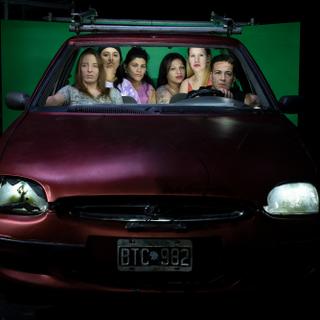


A politically charged South American presence at the Festival d'Avignon
ConversationOne-third of the theater festival's program will be performed in Spanish and will feature the works of Tamara Cubas, Tiziano Cruz and Malicho Vaca Valenzuela who explore the history and aesthetics of the body.
¿Habla usted español? If not, it's time to start! Spanish, the second most spoken language in the world (after Mandarin, and ahead of English and Hindi), will also be the second language of the 2024 Festival d'Avignon, with nearly a third of its program dedicated to it. This brings a spotlight on a host of little-known or unknown Latin American artists, for whom this language is central to intimate and political issues, blending identity, history (marked by military dictatorship), and postcolonial questions.
Some of them have already showcased their work in France, such as Argentina's Mariano Pensotti, who is creating (in French) Une Ombre Vorace ("A Voracious Shadow"), the festival’s now traditional traveling show. Lola Arias, also from Argentina, is presenting Los Dias Afuera ("The Days Outside"). This is also the case for Gabriel Calderon and Chela de Ferrari, from Uruguay and Peru respectively but both based in Spain, with their shows Historia d'un Senglar (o alguna cosa de Ricard) ("Story of a Boar [or something from Ricard]") based on Shakespeare's Richard III, and La Gaviota, based on Chekhov's The Seagull.
The other three are unknowns, whose artistic universe – which in all three cases is highly political – will be unveiled in Avignon. They are, in order of appearance, Uruguay's Tamara Cubas, with her play Sea of Silence; Argentina's Tiziano Cruz, with two shows, Soliloquio (me desperté y golpeé mi cabeza contra la pared) ("Soliloquy. I woke up and banged my head against the wall") and Wayqeycuna; and finally, Chile's Malicho Vaca Valenzuela, with Reminiscencia ("Reminiscence").
'Aspiration to decolonize'
Born in Montevideo in 1972, Cubas started in visual arts and dance, later focusing more on spoken word. This strong-willed woman heads the arts section of Campo Abierto, a hybrid and primarily agricultural venue in the middle of the countryside in the far north of Uruguay, on the border with Brazil. She has experienced exile firsthand, as her parents fled to Cuba when she was a child to escape the dictatorship that reigned in her country from 1973 to 1984.
For the past 20 years, her work, which includes installations, performances, dance and theater shows and rituals, has developed along two main axes, connected by what she calls an "aesthetic of precariousness." The first axis is the power of the body, the way in which the performative body is the bearer of autonomy," she explained. "Latin American bodies are driven by an incredible force; they are markers of memories, history and a ceaseless aspiration for decolonization." "The second," she continued, "is a study on the question of the Other, important in a country like ours where the original culture has been completely eradicated. Living together, heterogeneity and the common good are at the heart of my work."
You have 63.9% of this article left to read. The rest is for subscribers only.
